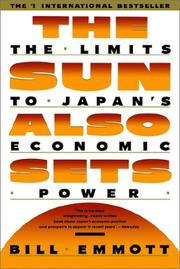| Listing 1 - 7 of 7 |
Sort by
|
Book
ISBN: 9026964439 9065332677 Year: 1991 Publisher: Houten : De Haan,
Abstract | Keywords | Export | Availability | Bookmark
 Loading...
Loading...Choose an application
- Reference Manager
- EndNote
- RefWorks (Direct export to RefWorks)
Physical geography --- geschiedenis --- maatschappij --- Japan --- J4000.90 --- J3390 --- politiek, internationaal --- geschiedkundige beschrijvingen --- economische politiek --- Japan: Social history, history of civilization -- postwar Shōwa (1945- ), Heisei period (1989- ), contemporary --- Japan: History -- Gendai, modern -- postwar Shōwa (1945- ), Heisei period (1989- ), contemporary

ISBN: 1873410107 Year: 1991 Publisher: Sandgate, Folkestone, Kent Japan Library
Abstract | Keywords | Export | Availability | Bookmark
 Loading...
Loading...Choose an application
- Reference Manager
- EndNote
- RefWorks (Direct export to RefWorks)
J4900.90 --- J3390 --- J4000.90 --- Japan: Education -- history -- postwar Shōwa (1945- ), Heisei period (1989- ), contemporary --- Japan: History -- Gendai, modern -- postwar Shōwa (1945- ), Heisei period (1989- ), contemporary --- Japan: Social history, history of civilization -- postwar Shōwa (1945- ), Heisei period (1989- ), contemporary --- Education --- Aims and objectives --- Social aspects --- History --- Japan --- 20th century --- Education - Japan - History - 20th century. --- Education - Social aspects - Japan. --- Education - Japan - Aims and objectives. --- Japan - History - 20th century.
Book
ISBN: 0192852426 Year: 1991 Publisher: Oxford Oxford University Press
Abstract | Keywords | Export | Availability | Bookmark
 Loading...
Loading...Choose an application
- Reference Manager
- EndNote
- RefWorks (Direct export to RefWorks)
J4600.90 --- J3390 --- J4624 --- Emperors --- -Rulers --- Sovereigns --- Heads of state --- Kings and rulers --- Monarchy --- Japan: Politics and law -- history -- postwar Shōwa (1945- ), Heisei period (1989- ), contemporary --- Japan: History -- Gendai, modern -- postwar Shōwa (1945- ), Heisei period (1989- ), contemporary --- Japan: Politics and law -- state -- emperor --- Biography --- Hirohito Emperor of Japan --- Japan --- Politics and government --- -Emperors --- Biography. --- -Japan: Politics and law -- history -- postwar Shōwa (1945- ), Heisei period (1989- ), contemporary --- -J4600.90 --- Hirohito, --- Shōwa Tennō, --- Shōwa, --- Yuren, --- 裕仁, --- 昭和天皇, --- 昭和, --- Shōwa --- Yuren --- Hirohito --- 裕仁 --- 昭和天皇 --- 昭和 --- 迪宮裕仁
Book
ISBN: 9067661007 9789067661003 Year: 1991 Volume: 100 Publisher: Amsterdam: Balans,
Abstract | Keywords | Export | Availability | Bookmark
 Loading...
Loading...Choose an application
- Reference Manager
- EndNote
- RefWorks (Direct export to RefWorks)
Wat is Japan voor een land, hoe functioneert de maatschappij, hoe denken, voelen en handelen de mensen daar? Achter het uiterlijk van een domocratie schult een machtssysteem dat zich aan geen regels houdt. De opvoeding, het onderwijs, media, politie, industrie en zelfs de onderwereld helpen bij de handhaving van dat machtssysteem. (Bron: covertekst)
economie --- japan --- Japan --- cultuur, politiek --- economische politiek --- economische situatiebeschrijvingen --- politiek, internationaal --- P52 --- 32 --- japon --- politiek --- #SBIB:328H53 --- #ECO:05.05:landen Azië --- 041874.jpg --- Instellingen en beleid: Japan --- Physical geography --- geschiedenis --- J4000.90 --- J4300.90 --- J4600.90 --- #gsdbS --- #SBIB:031.GIFT --- #ECO:01.01:economie algemeen --- Japan: Social history, history of civilization -- postwar Shōwa (1945- ), Heisei period (1989- ), contemporary --- Japan: Economy and industry -- history -- postwar Shōwa (1945- ), Heisei period (1989- ), contemporary --- Japan: Politics and law -- history -- postwar Shōwa (1945- ), Heisei period (1989- ), contemporary --- Political culture --- Politics and government --- Economic policy --- Political culture - Japan. --- Japan - Politics and government - 1945 --- -Japan - Economic policy - 1945 --- -J4000.90
Book
ISBN: 0691601909 1400862426 9781400862429 9780691078953 9780691601908 9780691631509 Year: 1991 Publisher: Princeton Princeton University Press
Abstract | Keywords | Export | Availability | Bookmark
 Loading...
Loading...Choose an application
- Reference Manager
- EndNote
- RefWorks (Direct export to RefWorks)
To understand how change occurs in politics, we should turn from concentrating on intentional political actions to exploring everyday life, especially marginal frames of mind in which people are open to questioning existing ideas and institutions. In so contending, Takako Kishima offers fresh understandings of contemporary Japanese politicians and the Japanese political process, while she also proposes an innovative method of looking at politics in general. Kishima points out that taken-for-granted values and beliefs are revealed as arbitrary when people experience intrusions of the marginal, or'liminal.'Social marginals, such as outcastes or so-called misfits, are the most likely people to invoke these intrusions, but more ordinary folk are also subjected to them under special conditions ranging from the seemingly trivial--daydreaming, dancing, or getting drunk--to the more profound--war, natural disaster, or ecstatic ritual. During an intrusion the flow of ordinary time seems to stop, and the utilitarian principles of commonplace existence are invalidated--as described by the chapter on Nakasone,'Shedding Tears: Suspension of Politics.'Drawing on insights from phenomenology, symbolic anthropology, and post-structuralism, as well as from political science, Kishima shows that the prevalence of liminal experiences in society prevents the reification of authority, allows the transcendence of formal political differences, and permits political change over time.
Politicians --- Marginality, Social --- Political development. --- Social change. --- Japan --- Politics and government --- Social conditions --- Change, Social --- Cultural change --- Cultural transformation --- Societal change --- Socio-cultural change --- Development, Political --- Exclusion, Social --- Marginal peoples --- Social exclusion --- Social marginality --- Social history --- Social evolution --- Political science --- Assimilation (Sociology) --- Culture conflict --- Social isolation --- Sociology --- People with social disabilities --- Social change --- Political development --- J4600.90 --- J4000.90 --- Japan: Politics and law -- history -- postwar Shōwa (1945- ), Heisei period (1989- ), contemporary --- Japan: Social history, history of civilization -- postwar Shōwa (1945- ), Heisei period (1989- ), contemporary --- E-books
Periodical
ISSN: 15153371 23142766 Year: 1991 Publisher: La Plata, Argentina : Instituto de Relaciones Internacionales
Abstract | Keywords | Export | Availability | Bookmark
 Loading...
Loading...Choose an application
- Reference Manager
- EndNote
- RefWorks (Direct export to RefWorks)
International relations --- World politics --- International relations. --- World politics. --- INTERNATIONAL RELATIONS. --- Since 1989 --- Arts and Humanities --- History --- international relations --- foreign policy --- international economics --- Colonialism --- Global politics --- International politics --- Political history --- Political science --- World history --- Eastern question --- Geopolitics --- International organization --- Coexistence --- Foreign affairs --- Foreign policy --- Foreign relations --- Global governance --- Interdependence of nations --- International affairs --- Peaceful coexistence --- World order --- National security --- Sovereignty --- Heisei Period (Japan)

ISBN: 0671735861 9780671735869 Year: 1991 Publisher: New York: Simon and Schuster,
Abstract | Keywords | Export | Availability | Bookmark
 Loading...
Loading...Choose an application
- Reference Manager
- EndNote
- RefWorks (Direct export to RefWorks)
Economic forecasting --- Competition, International --- Japan --- United States --- Foreign economic relations --- Foreign relations --- Politics and government --- Economic conditions --- J4300.90 --- J4540 --- J4810 --- International competition --- World economics --- International relations --- International trade --- War --- Japan: Economy and industry -- history -- postwar Shōwa (1945- ), Heisei period (1989- ), contemporary --- Japan: Economy and industry -- commerce and trade -- international trade, economic relations and policy --- Japan: International politics and law -- international relations, policy and security --- Economic aspects --- al-Yābān --- Giappone --- Government of Japan --- Iapōnia --- I︠A︡ponii︠a︡ --- Japam --- Japani --- Japão --- Japon --- Japonia --- Japonsko --- Japonya --- Jih-pen --- Mư̄ang Yīpun --- Nihon --- Nihon-koku --- Nihonkoku --- Nippon --- Nippon-koku --- Nipponkoku --- Prathēt Yīpun --- Riben --- State of Japan --- Yābān --- Yapan --- Yīpun --- Zhāpān --- Япония --- اليابان --- يابان --- 日本 --- 日本国 --- Foreign economic relations. --- JP / Japan - Japon --- 331.30 --- 382.50 --- Economische toestand --- Internationale handelsbetrekkingen: algemeenheden --- Economic forecasting - Japan --- Economic forecasting - United States --- Japan - Foreign economic relations --- Japan - Foreign relations - 1945-1989 --- Japan - Politics and government - 1945 --- -Japan - Economic conditions - 1989 --- -United States - Economic conditions - 1981-2001. --- Jepun --- Yapon --- Yapon Ulus --- I︠A︡pon --- Япон --- I︠A︡pon Uls --- Япон Улс
| Listing 1 - 7 of 7 |
Sort by
|

 Search
Search Feedback
Feedback About UniCat
About UniCat  Help
Help News
News